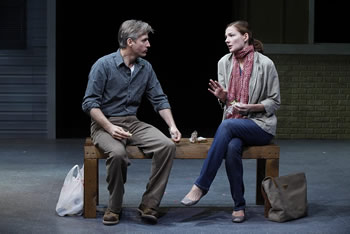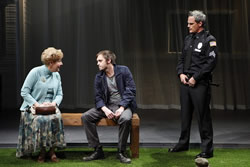
Another Half-Masterpiece
By Jonathan Kalb
Middletown
By Will Eno
Vineyard Theatre
108 E. 15th St.
Box office: 212-353-0303
In a corner of my mental library is an
imaginary shelf containing a group of dramas I call "half-masterpieces."
These are plays whose second acts struck me as baffling disappointments
at their premiere productions compared to the radiant originality
and breathtaking imaginativeness of their first acts--not just
minor letdowns, mind you, but utterly inexplicable failures of
nerve, scope and technique compared with the astonishing resonance
of what preceded them. Among the plays on this shelf (many the
object of much unreserved acclaim) are Caryl Churchill's Top
Girls, Tony Kushner's Homebody/Kabul, and David
Mamet's Glengarry Glen Ross--and they are now joined
by Middletown, Will Eno's first "full-evening-length"
work.
Eno's is an interesting dramatic voice.
His Thom Pain (based on nothing) was a remarkable debut
in 2005, a 55-minute, utterly uningratiating, Beckettian monologue
by an irascible yet intellectually playful and insatiably curious
man who resented being a dramatic character and indignantly repudiated
what he saw as his obligation to tell us a coherent story. The
piece was peppered with bright and surprising articulacy and Lewis
Black-style insult humor (prompting the indignant exit of a planted
spectator at one point), but both its depth and its comic charm
lay in its furious impatience and its clever use of self-deprecation
and audience-antagonism as forms of metaphysical investigation.
Eno's characters brood on spiritual emptiness.
They are more worldly than Beckett's indomitable tramps and decrepits,
but they share their persistent psychic restlessness. In Thom
Pain, in the evening of shorts Oh the Humanity and Other
Exclamations (2007), and in Middletown, Eno has
identified a peculiar brand of mental hermeticism among ordinary
contemporary people as his special field of exploration, writing
rambling yet philosophically pointed monologues in which moment-to-moment
perceptions are subjected to ruthless freeze-frame scrutiny. Volubility
is his characters' mode of living and thinking--of being, as the
existentialists used to put it--and that affinity with the likes
of Beckett, Joyce and Dostoyevsky is evidence of Eno's extraordinary
ambition.
Middletown--splendidly directed
by Ken Rus Schmoll in this New York premiere--introduces itself
as a sort of anti-Our Town, inviting us into a quintessential
American small town where quiet anxiety and uncynical self-consciousness
prevail. The environment David Zinn has designed, dominated by
a pair of dully modular house-fronts with windows big enough to
spy on the occupants, emphasizes the place's deadly normalcy and
regularity. Wilder's Grovers Corners was also suffused with quiet
anxiety, of course, but it wasn't as self-consciously trite as
Eno's Middletown, where "the main street is called Main Street
and the side streets are named after trees," as the local cop
tells us. Middletown is a postmodern cliché of hyper-normalcy,
an exaggeration relentlessly overworked in recent decades by David
Lynch, with his gently mocking, contrived surrealism. Eno isn't
interested in surrealism, thankfully. He focuses on quirkily perceptive
characters who chase their thoughts down idiosyncratic rabbit
holes of doubt and logical inference drawn from their everyday
experience.
The first character to appear is a Public
Speaker--played with wry, Rotarian nonchalance by David Garrison--who
welcomes us to the show and suggests he might be a sort of guide,
like the Stage Manager in Our Town. As it happens, he's
not up to that role. He can't even finish his greeting. His single
sentence becomes a slippery worm, a mad, Lucky-like digression
that enumerates all the possible listeners that occur to him,
stringing his mind along for five hilarious minutes:
Ladies and Gentlemen, Esteemed Colleagues,
Members of the Board, Middletonians, Local Dignitaries, everyone
really, stockbrokers, dockworkers, celebrities, nobodies, Ladies,
Gentlemen, all comers, newcomers, the newly departed, the poorly
depicted, people who are still teething, who are looking for
a helping verb, the quote beautiful, the unquote unbeautiful,
whose bones are just so, whose veins are just so, the drunk,
the high, the blue, the down, los pueblos, los animales,
foreigners, strangers, bookworms, those whose eyes are tired
from trying to read something into everything, those at a crossroads,
in a crisis, a quandary, a velvety chair, the dirty, the hungry,
yes, we the cranky, the thirsty, the furious, the happy, who
are filled with life, bloated with it. . .
Next to appear is the cop, a clean-cut,
haplessly overconfident fellow played with dead-on obtuseness
by Michael Park, who speaks in proud and proprietary generalizations
about the town, suggesting that he might be our Wilderesque guide,
except that he has nothing much to say about Middletown and soon
distracts himself by violently harassing an innocent bystander
on a bench. And so it goes for the rest of the act, with various
other characters introduced in situations that begin in a familiar
vein and then veer off toward peculiar or disturbing sidings.
None of these people has enough self-possession, let alone objectivity,
to narrate more than a tiny piece of the overall story.
 A
romance seems to bud, for example, between a handyman named John
Dodge (Linus Roache) and a woman named Mrs. Swanson (Heather Burns)
who is new to town and whose husband travels a lot, but their
fragmented and desultory conversations only deepen their separateness.
A tourist couple visiting the town is bored by the sole stone
monument there and asks if the tourguide can do better ("we just
like some perspective with our history. Some little, like, gossipy
footnote about a local dish or a bastard child"), whereupon the
guide embarks on a woolly and tentative speech about the continuity
of molecules across eons. An astronaut (a native of Middletown)
is moved to wax mystical about the enormity of the view from his
space capsule, but he can't find adequate language and the clichés
he does muster bore his ground-control handlers, who steer him
back to dry radio protocol.
A
romance seems to bud, for example, between a handyman named John
Dodge (Linus Roache) and a woman named Mrs. Swanson (Heather Burns)
who is new to town and whose husband travels a lot, but their
fragmented and desultory conversations only deepen their separateness.
A tourist couple visiting the town is bored by the sole stone
monument there and asks if the tourguide can do better ("we just
like some perspective with our history. Some little, like, gossipy
footnote about a local dish or a bastard child"), whereupon the
guide embarks on a woolly and tentative speech about the continuity
of molecules across eons. An astronaut (a native of Middletown)
is moved to wax mystical about the enormity of the view from his
space capsule, but he can't find adequate language and the clichés
he does muster bore his ground-control handlers, who steer him
back to dry radio protocol.
What links all of these vignettes is their
shared theme of psychic centerlessness, a feeling of disempowerment
specific to people who are superficially comfortable in the world.
All the characters desperately long for some perspective from
which they might see and thwart what ails them, and Middletown’s
exaggerated normalcy is a trope for their sense of entrapment
within tormentingly smooth walls. It’s as if they all seek
points of traction, or creative friction, that might vary their
outlooks a bit and allow them to climb above their habitual mental
refuges momentarily and see their situations whole. Their efforts
are, as expected, heartbreakingly futile.
Eno paints this dilemma vividly and makes
it theatrically exciting for an hour or so. Unfortunately, he
has little more to say about it than what is packed into the establishing
circumstances. After intermission, Middletown grows tediously
redundant and predictable, becoming an essentially conventional
dramatic experience centered on the dreary story of Dodge and
Mrs. Swanson’s non-affair. A few more of those philosophically
meaty, disconnected vignette scenes crop up, but they come off
as afterthoughts, making exactly the same points about emptiness
and separateness heard before. With the adjacent house-fronts
replaced by adjacent hospital beds, the thrust is numbingly directed
toward the approach of a hackneyed resolution in which the end
of one life (Dodge’s) is neatly juxtaposed with the beginning
of another (Mrs. Swanson’s newborn child). The character
Thom Pain—keen critic as well as a merciless repeater of
the phrase “I don’t know”—would have savagely
skewered such a mendacious imposition of balance, harmony and
order.
It is puzzling indeed to see a falloff
so precipitous from a writer of Eno’s talent and insight,
and though I have no information on how it occurred, I strongly
suspect it had to do with pressure on him to produce “evening-length”
work, since all his earlier pieces were short. Which only prompts
me to ask: what is wrong with being a master of the gem-like short?
Yes, it probably would reduce one’s opportunities for regional
and Off-Broadway productions (though that never fazed Beckett
or Pinter). The dubious alternative, though, is to become a nominally
successful Off-Broadway dramatist whose second acts are plainly
unworthy of his first.
